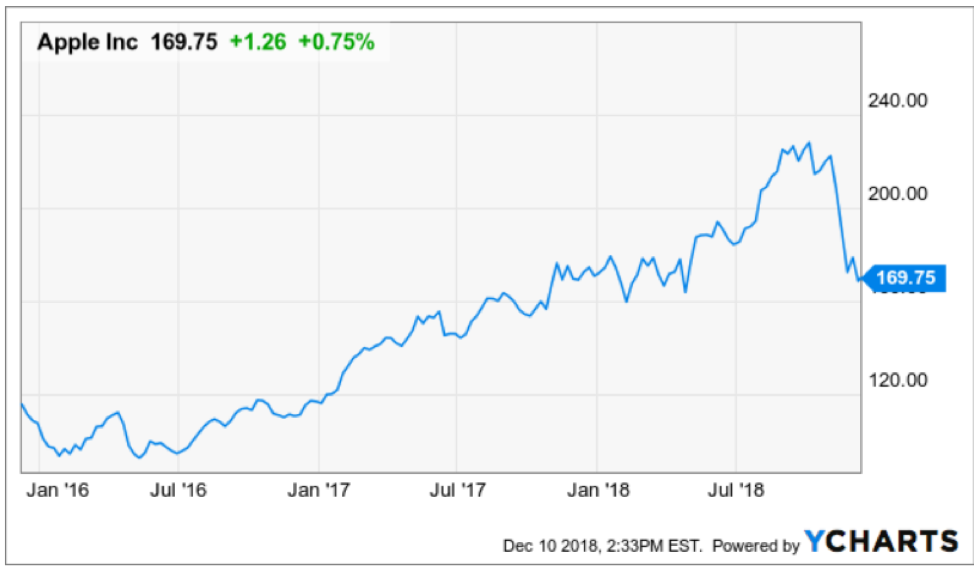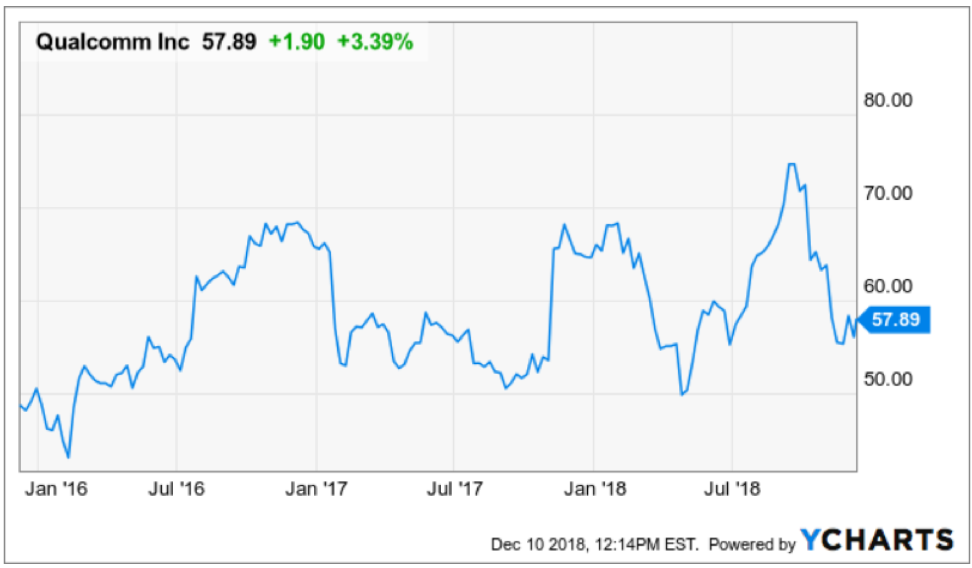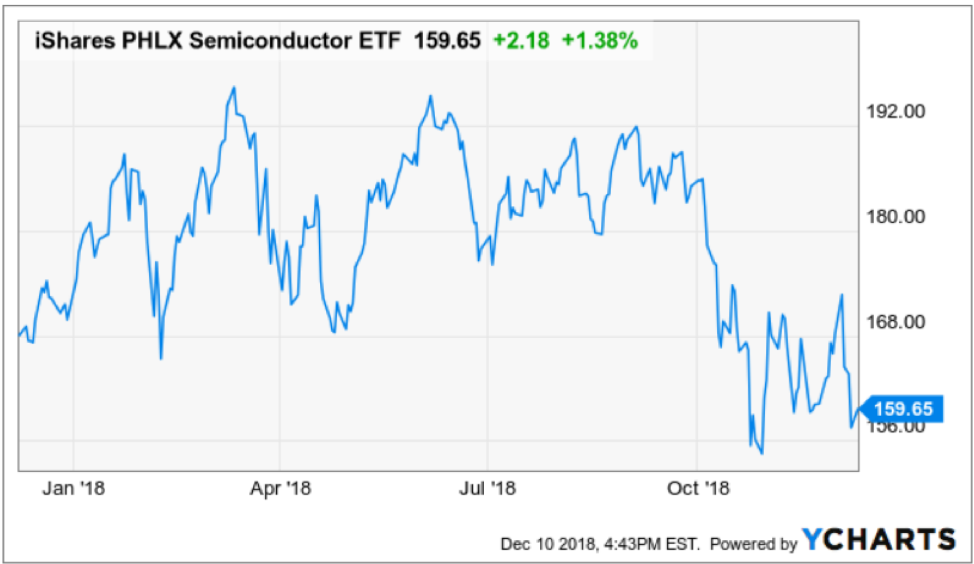The Real Story About Apple
If you can’t handle the heat, then get out of the kitchen.
Well, the kitchen is getting a little bit toasty right now.
Apple (AAPL) was handed down a demonstrably negative verdict when a regional Chinese court ruled that they infringed on two patents belonging to Qualcomm (QCOM).
The Qualcomm chips were connected to photo editing and another to swiping on a touch-screen device.
This means that Apple won’t be able to sell legacy iPhone models in China which is a damaging blow to revenue prospects because older iPhone models in China offer attractive price points to wallet-light Chinese.
And when you add this all up, the ban includes over half of the iPhones on sale in China.
In general, less affordable, sleeker, fresher iterations price out many Chinese who want a piece of the Apple dream.
Even though this was a nice victory for Qualcomm, it spells trouble for the broader tech sector.
Apple’s myriad of chip suppliers who have grappled with a torrent stream of woeful news this year relating to Apple’s supply of iPhones and supply forecast of iPhones are first on the chopping block.
It’s also an excruciating blow to American business in China and this could potentially rule out any American management taking future business trips to China.
Apple looks set to join its chip company compadres on the sidelines as a stock to avoid like the plague at the moment.
Apple is a great company and a perfect hold to eternity stock, but this is not the time to jump in and out of it.
Let me explain why.
The trade war centered on future technological hegemony is directly connected to the domination of current technology in artificial intelligence, chip development, and 5G.
China has been furiously catching up to American tech the last two decades through its vast program of foreign technological forced transfers and outright intellectual property theft.
I remember testing my first shoddy Chinese smartphone from the Chinese company Coolpad to gauge a sample of the burgeoning Chinese consumer device market on a blistering hot day in Beijing in the summer of 2010.
It was one of the first iterations of Chinese smartphones on the local market and the 3G smartphone was simply terrible.
The hardware was iffy, software was untenable, design was hodgepodge and it ceased working after 3 painstaking months of testing.
I breathed a sigh of relief because I knew it would be years before Chinese tech could ever produce something material.
Since then, China and the love given to its tech sector through the state protecting its homegrown companies have come a long way since those teething years filled with shabby products and inferior expertise of yesteryear.
Chinese cell phones are now comparable to iPhones for a fraction of the cost especially the new Huawei and Xiaomi models and the companies want recognition for their success.
I have interviewed scores of Huawei engineers who describe a life of grinding out a modest existence in mega-cities dotted around China.
They lament the 12-hour back-breaking work days, suffocating authoritarian management style, and the 3am on-call staff meetings, but they rejoice in the accomplishment of collecting that down payment for a standard Chinese apartment in a subpar constructed building.
They earn 30% of what Apple engineers make per year just to seize an average life in a second-tier Chinese city.
They don’t complain and accept it as a consequence of cut-throat competition in a country of 1.3 billion trying to hustle the best they can.
These unbearable timelines and the crunch to develop the national brand of Huawei and its other protected tech behemoths is how China rose up from the ashes of irrelevancy to become arguably competitive with the American tech machine that is Silicon Valley.
Even through all of the local hyper-growth, there was one unwritten rule that allowed one squeaky clean American company from Cupertino to evade all of the fractious competition and make an absolute killing in China.
Apple was protected in China before until now that is.
I find it dubious that the timing of the court verdict was the first business day after the arrest of CFO of Huawei Meng Wanzhou.
By connecting the dots, this appears as if it was an indirect ruling from the higher-ups signaling that Apple won’t be handed a free pass anymore and a warning shot fired to Washington.
Even worse, the Chinese regulatory environment is opaque at best-giving discretion to Chinese authorities to do as they see fit.
The opaque nature of Chinese regulation can draw out cases for years potentially drowning out the sales of iPhones and banishing Apple and its products in China to the history books.
That is the worst-case scenario that probably won’t happen.
For Apple to even appeal this ruling offers Steve Jobs' brainchild a rare dose of reality in China, and the bruised Apple brand will go back to the drawing board after receiving severe harm to its previous image of an ultra-luxury brand on the Chinese mainland.
For other American companies, there is no way to flush out additional clarity, and they will get stonewalled if they want more details regarding the path forward and that in itself will damage the price action of stocks tilted towards China because of the wave of uncertainty.
At the extreme minimum, this escalation of pressure will make it arduous to maneuver to some sort of trade agreement let alone in the abbreviated 90-day window agreed on in Buenos Aires.
The Chinese national psyche cares a great deal about saving face and this dig at its national prize will be hard to forget.
And China has a habit at looking at these types of events as inclusive actions tallied up broadly inside a comprehensive portfolio labeled and pigeonholed as America, Canada, and so on.
This conspicuous move has pushed forward Canada into the forefront of the firing line which could become the silver lining to this quagmire because Canada will have more incentive to join in on the China rebukes with America if they get blacklisted by Beijing.
Uniting together as one pan-North American and the European task force would be the best method to combat China’s stealthy business acumen whose capital and influence are far-flung and hard to quantify because of its various gateways to global western pressure points.
I can tell you right now that after doing a quick jaunt of Belarus, the Ukraine, and Hungary this winter, China’s deep pockets and nationals have completely taken over Central and Eastern Europe.
Chinese companies and products are plastered all over the place in each Russified city center and cityscapes built in the Soviet era.
Chinese students and workers have flooded these markets as they line up around the fringes of the Western world armed with gobs of capital and a land-grab mentality that borders Amazon’s ambition.
The Budapest property market has been cornered by Chinese citizens looking for the cheapest entry point to permanent residence in the Eurozone.
If you want to rent a flat in Budapest, odds are a Chinese owner will be glad to accept your monthly rent payments.
China believes that to truly have its tentacles deep inside the Western apparatus, they must initially corner the peripheries of the Western World that thirst for capital to build up local economies to match the power and stature of the Western big boys.
This has all added up to the Chinese government having an influential voice in European affairs because they have direct sway with conservative Prime Minister of Hungary Viktor Orban who has accepted Chinese capital.
US executives are praying to the celestial heavens that Meng is not extradited to America and made the scapegoat of the broader trade war.
This would be a bitter pill to swallow for Huawei’s founder Ren Zheng Fei whose family is considered royalty inside the upper-level Chinese establishment.
I assume that Ren will not back down quietly and is pushing and pulling the behind-the-scenes levers to do what he can for his daughter.
What does this all mean?
Headline risk has shot through the roof and investors could hear any day of the rumblings to the next chapter of the trade saga that is enveloping more and more corporate collateral damage.
Apple’s next quarter’s earnings are also on the line, and CEO of Apple Tim Cook could conveniently use it as a throwaway quarter hyping its progression as a new software and subscriptions company which is indeed in the works.
I figure this is the base case for Apple especially if there is no quick solution to this new iPhone ban.
The transition has been dramatically painful and happened a year or two too early for Apple’s liking.
Consequently, Apple reigning in its expectations has crushed the stock recently.
Certain global banks could set to be punished after the Wall Street Journal reported that HSBC and Standard Chartered facilitated the illegal payments for Huawei.
The British bank problems don’t stop there with Britain as a country barreling towards a complete ban of Huawei products after New Zealand just announced their own ban.
The three biggest Japanese telecommunication companies dumped fuel on Huawei’s bonfire citing security issues for excluding Huawei products from Japanese 5G development.
The roller-coaster action could also give impetus to Chairman Xi to execute a power grab on Chinese domestic technology sector gifting him additional control over tech behemoths in the name of national security fortifying his multiplying power in China.
He did the same with the People Liberation’s Army and I see no reason why he wouldn’t do the same with the Chinese tech sector especially if western countries avoid Huawei products.
The Chinese regulatory presence has already reared its ugly head banning new video game licenses to Tencent slashing revenue streams in 2018.
That is why Tencent shares have grossly underperformed this year.
Theoretically, Xi could use this moment as a springboard to seize the reigns of Huawei citing illegal payments to Iran which would calm the trade tensions but beef up his clout in the tech community, a net negative for Silicon Valley.
In any case, there is substantial amount of uncertainty permeating the heart of the technology movement that could potentially splinter off violently into an American tech and Chinese tech world.
This hard landing would deprive China-based revenue and kill supply chains for American technology that have spent decades procuring these intricate systems.
For Chinese technology, they could be cut off from the important components required to develop the technology and chips they need to achieve its “Made in China 2025” state-subsidized targets aimed at rapidly expanding its high-tech sectors and developing its advanced manufacturing base.
The next few months will reshape the 2019 Silicon Valley landscape and certain companies are hoping their business models aren’t fully destroyed.
I can’t lie but I saw this coming when I became aware of the complicated relationship between foreign tech companies and its precious Chinese revenue, and I also never bought another Coolpad smartphone.





